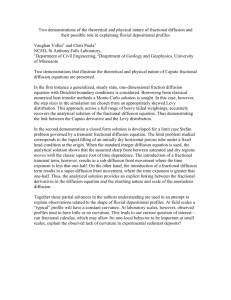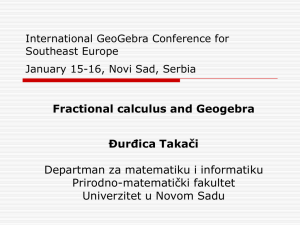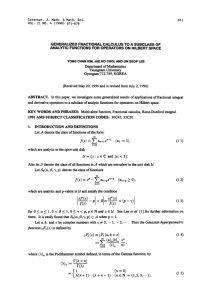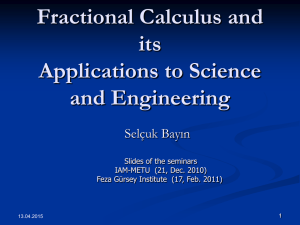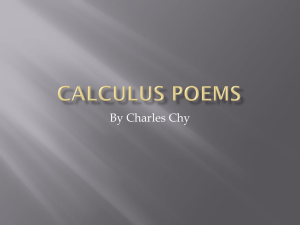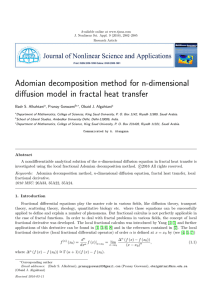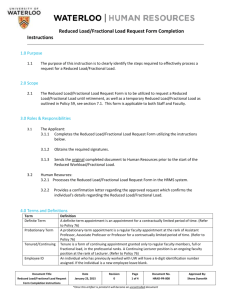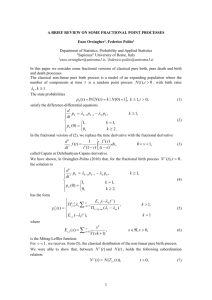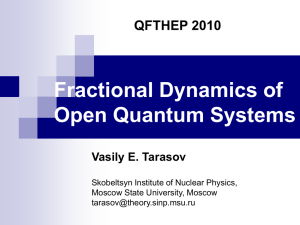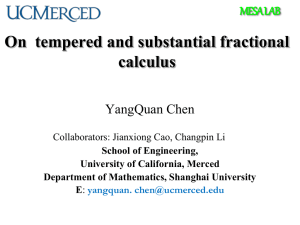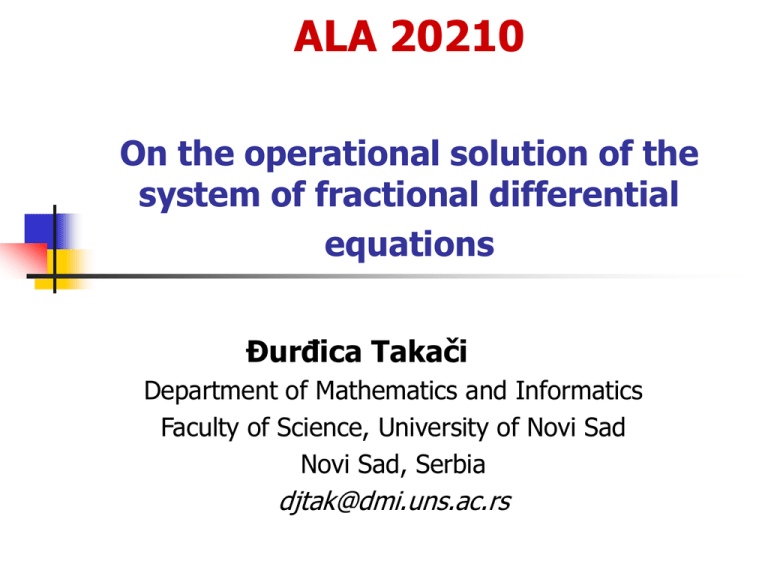
ALA 20210
On the operational solution of the
system of fractional differential
equations
Đurđica Takači
Department of Mathematics and Informatics
Faculty of Science, University of Novi Sad
Novi Sad, Serbia
djtak@dmi.uns.ac.rs
The Mikusinski operator field
0,
,
The set of continuous functions Cwith supports in
with the usual addition and the multiplication given by
the convolution
t
f g (t ) f (t ) g ( )d , t 0
0
is a commutative ring without unit element.
By the Titchmarsh theorem, C it has no divisors of zero;
its quotient field is called the Mikusinski operator field
The Mikusinski operator field
The elements of the Mikusinski operator field are
convolution quotients of continuous functions
f
,
g
f C ,
0 g C ,
The Mikusinski operator field
The Wright function
,
z
n0
e s 1 ,0
t
t
zn
. #
n!
n
||
1
, 0 1 , #
2
The character of the operational function
e
s
The matrices with operators
AX B, #
A,
n n
square matrix, B is a given vector,
T
X
x1 x2 xn
is the unknown vector
a ij a 1ij I a 2ij , #
b i
b 1i I b 2i
p , #
xi
Pi
,
Qi
i 1, 2, , n,
1 1 2
Example
2
x1
1
x2
1 2
x3
2
4 2 1
1 11 70
x1
2
3
5 11 2 3 3 9
27
1
I ( )
3
2
2 4 1 3
5 11 2 3
2
X 5 2711 2 2 23 3 .
2 3 11 2 28
5 2 11 2 3 3
2
1
2
,
2
587
81
3
5209
243
4
47 234
729
11 70 587 t 2 5209 t 3 47 234 t 4
( ) t
81 2 243 3! 729 4!
9 27
5
The matrices with operators
AX B, #
A,
n n
square matrix, B is a given vector,
T
X
x1 x2 xn
is the unknown vector
a ij a 1ij I a 2ij , #
b i
b 1i I b 2i
p , #
xi
Pi
,
Qi
i 1, 2, , n,
The matrices with operators
The exact solution of
A X B
T
X
x1 x2 xn
,
x i x ki k1 #
The approximate solution
k1
m
T
X m
x 1m x 2m x nm
,
x im x ki k1 , #
k1
Fractional calculus
The origins of the fractional calculus go back to the
end of the 17th century, when L'Hospital asked in a
letter to Leibniz about the sense of the notation
Dn
Dx n
,
n 1/2
the derivative of order 1/2
Leibniz replied:
“An apparent paradox, from which one day useful
consequences will be drawn"
Fractional calculus
The Riemann-Liouville fractional integral operator of
1
order 0
J f ( x)
(t ) 1 f ( )d , 0,
( ) 0
J J f ( x) J J f ( x),
Fractional derivative in Caputo sense
u ( x, t )
0
D u ( x, t )
m
u ( x ,t )
t
t m ,
t
m
1
m 1 u ( x , )
( t )
d ,
( m )
m
m 1 m
m
, 0
Fractional calculus
Basic properties of integral operators
J J f
tJ f
t
, 0;
J J f
tJ J f
t
;
c
1
J t c c1t c ,
#
Fractional calculus
Relations between fractional integral and
differential operators
D J f (t ) f (t );
m 1
J D f (t ) f (t ) f
k 0
(k )
tk
k!
(0 ) .
Relations between the Mikusiński and
the fractional calculus
J f ( x) f
D u ( x, t )
m
s u ( x)
m
m
m 1 k
u
(
x
,
0
)
s
k
t
k 0
m 1
k
s u ( x) k u ( x,0) s k 1
k 0 t
m 1
k
On the character of solutions of the
time-fractional diffusion equation
to appear in
Nonlinear Analysis Series A:
Theory, Methods & Applications
Djurdjica Takači, Arpad Takači, Mirjana Štrboja
The time-fractional diffusion equation
u ( x, t ) 2 u ( x, t )
,
2
t
x
x R,
0 t T
t
1
d
u
(
x
,
)
,
0 1,
(t )
u ( x, t ) (1 ) 0
t
2
t
1
d
u
(
x
,
)
, 1 2.
1
(1 ) 2
(t )
0
The time-fractional diffusion equation
with the conditions
u( x, 0 ) ( x), x (0, l ),
u ( x, 0 ) ( x),
u ( x, 0 )
( x),
t
0 1
x (0, l ),
1 2
u
0, tf
t
, u
1, tg
t
, t 0, #
The time-fractional diffusion
equation
1 t
d
(1 ) u ( x, ) (t )
0
, ( su ( x) ( x))1
s u ( x) s ( x),
1 t 2
2
2
d
u
(
x
,
)
,
(
s
u
(
x
)
s
(
x
)
(
x
))
1
(2 ) 2
( t )
0
s u ( x) s ( x)) s ( x))
0 1,
1 2
2
The time-fractional diffusion equation
In the field of Mikusinski operators the time-fractional diffusion equation
has the form
s u ( x) s ( x)) u( x),
0 1,
u( x) s u ( x) s ( x))
s u ( x) s ( x)) s ( x) 2 u( x),
u( x) s u ( x) s ( x) s ( x)
u
0f,
2
u
1g, #
1 2,
The time-fractional diffusion equation
The solution is
u ( x) C1e
xs / 2
C1e
xs / 2
u p ( x),
The character of operational functions e xs,
The Wright function ,0
e
xs
1 ( x) n t n
1
, 0 ( xt )
.
t
t n 0 n!(n)
The time-fractional diffusion equation
The exact solution
ux u p 0f e
x2k
1s /2
k0
e
x2ks /2
k0
u p 1g e
k0
x2k
1s /2
e
k0
x2k
1s /2
u p x.
A numerical example
u
2
x, t
u
x, t 2e x t 2
2 x
t
e ,
2
3
t
x
u
x, 00,
#
u
0, tt 2 ,
The exact solution
In the Mikusinski field
0, 1
,
0 1 # x
u
1, tet 2 , #
0 t T.
u
x, tt 2 e x ,
u
xsu
x2e x 3 23e x . #
u
023 ,
u
12e3 , #
A numerical example
The solution has the form
u
xC 1 e
xs /2
C 2 e
xs /2
u p
x
,
up
x2e x
3 3
i
i0
. #
A numerical example
The exact solution
i0
k0
ux 23 3i 23 e
x2k
1s /2
i0
k0
2e3 3i 2e3 e
2e x 3 3i .
i0
/2
e x2ks
k0
x2k
1s /2
/2
e x2k1s
k0
A numerical example
p
n
ũxn 2 2 e
3
3
i
3
i0
x2k
1s /2
k0
n
i0
k0
2e3 3i 2e3 e
2e x 3 3i .
i0
e
x2ks /2
k0
p
p
n
x2k
1s /2
n
/2
e x2k1s
k0
A numerical example
The system of fractional differential
equations
Initial value problem (IVP)
d x(t )
BX (t ),
dt
x [ x1 x2
x(0) [ x1 (0) x2 (0)
xn ]T , [1 2
n ],
xn (0)]T ,
0t a
B [aij ]in, j 1 R n R n
0 i 1, i 1,..., n
d d 1 d 2
d n
1 , 2 , , n
dt
dt
dt dt
i,
ri
, i 1, , n
mi
Caputo fractional derivative, order
s1 X 1 s1 1 x1 (0)
X1
2
X
2 1
s X 2 s x2 (0)
2
B
s n X n s n 1 xn (0)
X n
AX B
a11 s1 a12
a1n
2
a
a
s
a
21
22
2n
,
A
n
an1
an 2 a2 n s
n
p
Aijk t ck
i 0
k 1
k !(ck c i 1)
x j (t ) (
1
c ,
m
s1 1 x1 (0)
2 1
s
x
(0)
2
B
1
s n xn (0)
)t c i xi (0)
m lcm(m1 , m2 ,..., mn ),
ri
i , , i 1, , n
mi
The initial value problem (IVP) has a unique
continuous solution x
References
Caputo, M., Linear models of dissipation whose Q is almost
frequency independent- II, Geophys. J. Royal Astronom. Soc.,
13, No 5 (1967), 529-539 (Reprinted in: Fract. Calc. Appl.
Anal.,11, No 1 (2008), 3-14.)
Mainardi, F., Pagnini, G., The Wright functions as the solutions of
time-fractional diffusion equation, Applied Math. and Comp.,
Vol.141, Iss.1, 20 August 2003, 51-62.
Podlubny, I., Fractional Differential Equations, Acad. Press, San
Diego (1999).
Ross, B., A brief history and exposition of fundamental theory
of fractional calculus, In: "Fractional Calculus and Its
Applications" (Proc. 1st Internat. Conf. held in New Haven,
1974; Ed. B. Ross), Lecture Notes in Math. 457, Springer
Verlag, N. York (1975), pp. 1-37.
Podlubny, I., Fractional Differential Equations, Acad. Press, San Diego
(1999).
Ross, B., A brief history and exposition of fundamental theory of
fractional calculus, In: "Fractional Calculus and Its Applications" (Proc.
1st Internat. Conf. held in New Haven, 1974; Ed. B. Ross), Lecture
Notes in Math. 457, Springer-Verlag, N. York (1975), pp. 1-37.
Thank you for your attention!

